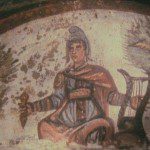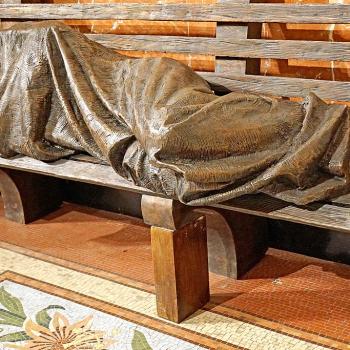
Last summer, I searched Amazon for used copies from the Fathers of the Church series which I did not yet possess, looking, moreover, for texts which I felt were in the price range I was willing to spend. Among the volumes I found was the one dedicated to Salvian the Presbyter. At the time, he was an unknown figure, so I looked online and read a little about him; finding out his main theme throughout his work was the failing of Christians to meet the demands of social justice, I thought the book would be a good addition to my library.
When I received it in the mail, I quickly read through it. I found the introduction was right in one thing: Salvian can be repetitive, but yet I found he was pressing hard on a theme which was needed at the time. Christians had failed to follow Christ, and this had a grave impact on the Roman Empire, allowing it to fall. The sins of the Christian, more than the pagans, was to blame, and the judgment of God was shown by the conquest of Rome by various hostile pagan tribes. Avarice more than anything else was at the heart of Salvian’s critique, though he certainly looked at and commented upon other social vices of his time, showing how they helped weaken the state, until at last, it could not hold itself together against its external foes.
I mentally took notes and saw how Salvian would be a useful complement to many other ancient writers like St. Basil, St. John Chrysostom, and even St. Cyril of Alexandria, in addressing the common sins of the Christian elite. His was yet another voice against the love of money, but his commentary was more social and political in nature than many other patristic sources. Certainly, he touched upon the impact of such sin on Christians and how they risked perdition, like St. Basil, but he was also concerned in the way sin could and did affect the state. The consequences of sin are not just spiritual, but material as well, and he showed how it is only a matter time in which all will feel the impact of a state run through the lens of avarice.
It was only after the election of Donald Trump to the presidency of the United States that I felt my reading of Salvian was more than apropos, but was providential, giving me a new foundation for my upcoming criticism of his policies and how they will end up affecting the world as a whole. I told people that I felt it was time to go “Full Salvian,” to take seriously what Salvian wrote, but to update it to modern times, and to use it as a criticism of the up-and-coming state of affairs in the United States as well as a criticism of all the elite who would be defending Trump, using his rhetoric as a means of defending their own ill-gotten gains.
I have already written a few posts based upon statements found in the works of Salvian, and in the next coming year, I will be doing more. Initially, they will be very direct, often engaging and revealing his words to my readers, but events unfold, I will be taking his ideas further into the modern age, often following him in spirit but adding to it in order to reflect the new, modern order being established by Trump. That is, I went to first establish Salvian’s general arguments, to have a foundation from which to gather forth my ideas, but then, as needs arise, I will take those general arguments and engage particular grave evils as they arise, adapting, developing, furthering Salvian’s criticism.
However, while I think his words often speak for themselves and those following my posts will be able to follow through with his argument and my adaptation of them, I have thought it might be useful to give a little more background to Salvian himself. While he can be considered a Father of the Church, and he was close friends with significant and more well-known figures of his age, Salvian himself is rather obscure. A part of the problem is we have only a few of Salvian’s treatises in existence, so that he did not leave behind a wide variety of literature for us to study. Another problem is we know little of his own personal biography: we know some key events and struggles he faced in his life, but without a complete picture of his life, it is hard to come to him and see him as we do with most influential patristic writers.
![I, Alberto Fernandez Fernandez [GFDL (http://www.gnu.org/copyleft/fdl.html), CC-BY-SA-3.0 (http://creativecommons.org/licenses/by-sa/3.0/) or CC BY 2.5 (http://creativecommons.org/licenses/by/2.5)], via Wikimedia Commons](https://wp-media.patheos.com/blogs/sites/637/2017/01/Church_and_monastery_of_the_L%C3%A9rins_Abbey-1-300x97.jpg)
Sometime, while he was in the monastery, he was elevated to the priesthood, and his teaching skills would be recognized so much that he would be called the “master of bishops” by the historian Gennadius of Massilia. He did not leave behind a great volume of literature, and yet even what little he wrote did not all come down to us; what we possess from his oeuvre are a few letters and two major works, On the Governance of God and Four Books To the Church.
As mentioned above, the key significance of his writing was his call for moral reform for Christians, especially for Christian leaders who took positions of power in the state. His work serves as a companion piece to St. Augustine’s City of God and Orosius’ Seven Books of History, as a discussion for the fall of the Roman Empire. Unlike Augustine and Orosius, who wrote apologetically to pagans and doubtful Christians, Salvian wrote unapologetically to the Christians, stating that the collapse of society was at the hands of the Christians, not because they had become Christian, but because they had failed to live out their faith when they came into power. Christianity taught justice, and expected rulers to rule without selfish ambition. Sadly, what happened is its leaders took little to no concern with the plight of poor, they ignored the demands of justice, and instead concerned themselves with acquiring wealth for themselves and living a life of luxury. From the grave offenses of the Christian leaders of the state, Salvian believed the fate of the nation had been determined. They weakened the state, making it ready for the barbarians to take it over; and because the rich elite found all kinds of ways to burden the poor, ordinary citizens, the they even made it easier for the ordinary citizens to rebel and accept the outcome of the invasion, which often resulted in slightly better conditions for them, and a more moral, stable leadership.
And so, unlike Augustine and Orosius, Salvian agreed in part with the pagans that Rome fell because of the way Christians had come to rule the empire. It was not because the Christians had abandoned the old pagan cults, as pagans suggested, but because they failed to be Christian. Rome became weak, and easily fell to its invaders, because the Christians became too lax and did not see the state decaying from within leaving room for the barbarians to advantage of the terrible morale of the Roman populace.
It is because of the high moral expectations he places on Christian leaders of state, and the consequences he maps out for what happens when those expectations are not met, Salvian has had a lasting, even if indirect, significance on Christian understanding of social justice. His writings have a prophetic element to them, warning Christians what happens when they allow the state to bow down to the sin of avarice. With the up and coming Trump presidency, where corporate rule seems to be taking over the interests of the state, with so-called Christians supporting the audacity of avarice to rule, Salvian seems to be the person Christians need to look to in order to understand what to expect if Trump is not stopped from looting the nation. Christians have to call out the immorality of avarice and where it leads now, not when everything falls apart.
And so this year I am going to be going “Full Salvian.” Obviously, not all of my posts will be dealing with the concerns of social justice; I am interested and want to provide my readers a wide range of philosophical, spiritual and theological discussions, but I feel that I will have to engage and take seriously the concerns of Salvian and raise them up to the present generation. It is not my preferred from of discourse, but it is what is needed today, more than ever before.
Get ready. The world is going to go crazy. Make straight your ways, so that the coming chaos does not sweep you away.
Stay in touch! Like A Little Bit of Nothing on Facebook:
A Little Bit of Nothing













